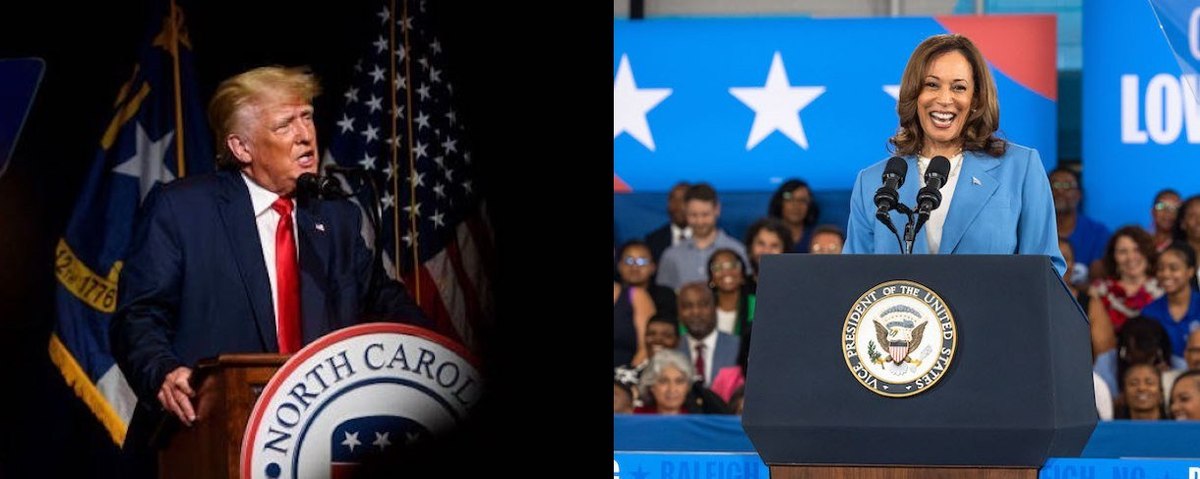The presidential race remains close, both in terms of who Americans plan to vote for and — as a new survey shows — who they expect to win Tuesday's debate. Presidential candidates Kamala Harris and Donald Trump will face off for the first time on Tuesday, September 10, in a debate hosted by ABC News. It could also be the last time: No other Harris-Trump debates have been scheduled. More Americans expect Harris than Trump will do a better job staying calm under pressure, but a larger share think Trump will be more persuasive.
Most Americans (82%) have heard something about the debate, and 65% say they definitely or probably will watch it. Majorities of Americans want the debate to cover inflation, health care, and border security. Few expect to have their minds changed by the debate, and just 17% say they've ever changed their mind due to a presidential debate.
Fewer (44%) have heard something about the upcoming vice presidential debate on October 1 between Tim Walz and JD Vance, hosted by CBS. About half of Americans (52%) say they plan to watch it.
Candidate debate styles
Harris and Trump each are seen as having their own strengths and weaknesses when it comes to debating. Between the two presidential nominees, Harris is seen by more as being better at staying calm under pressure, and as more knowledgeable on policy issues. Trump is likelier to be seen as more persuasive and more physically intimidating — as well as likelier to interrupt, go over his allotted time, and make personal attacks. More say Trump than Harris would lie during a debate, or dodge a question.
The candidates are virtually tied in terms of who Americans think is a better debater (41% say Harris and 41% say Trump) and who they think is more likely to win the debate (39% Harris vs. 38% Trump).
We asked the equivalent questions before and after Trump's debate against Biden on June 27. Prior to Harris' debate, Americans are more likely to say that she is a better debater than Trump than they were to say the same about Biden prior to — and after — his debate against Trump. Far more thought that Biden would fumble over his words — and said he did after the fact — than say the same about Harris.
Similar to how views of Harris and Trump diverge, slightly more think that Walz would be better at staying calm under pressure during a debate — and more knowledgeable on policy issues — than his Republican opponent, Vance. More say Vance than Walz is likelier to make personal attacks, be physically intimidating, interrupt his opponent, and go over the allotted time.
Debate topics, moderators, and format
Inflation tops the list of topics that Americans want moderators to ask candidates about during the upcoming presidential debate: 58% of people choose it from a list of topics from which they could select all that they think apply. Health care (51%) and border security (51%) are tied for second place, followed by Social Security (47%), taxes (45%), and abortion (44%).
The topics most likely to be selected by Democrats are health care, abortion, Social Security, inflation, and democracy. Among Republicans, the most frequently chosen are inflation, border security, taxes, national debt, and Social Security.
Fewer than half of Americans have opinions on each of the moderators for the upcoming presidential and vice presidential debates. For the September 10 debate, these include ABC News anchors David Muir — whom 26% of Americans view very or somewhat favorably and 18% view unfavorably — and Norah O'Donnell, whom 23% view favorably and 19% unfavorably. Margaret Brennan and Linsey Davis, who will moderate the October 1 vice presidential debate on CBS, are even less well-known.
There has been disagreement between the Harris and Trump campaigns over a policy muting debate microphones to prevent interruptions — a policy which was in place during the Biden-Trump debate. Biden’s campaign made microphone muting of the candidate who isn't speaking a condition of its decision to participate in any debates, while Harris' campaign has opposed muting microphones.
Most Americans (66%) support the policy, including most Democrats (67%). But Democrats' views have shifted some since just before the Biden-Trump debate: Then, 82% of Democrats favored the microphone muting policy, 15 percentage points more than the share that currently do.
Related:
- Harris vs. Trump: How Americans evaluate them on personality and policy
- How views of Biden and Trump changed after the first debate
- Snap post-debate poll: 30% of Democrats say 'someone else' would be a stronger candidate than Biden
- 2024 presidential debates: Voters' preferences for topics and format
See the results for this YouGov poll
Methodology: This poll was conducted online on August 29 - September 1, 2024 among 1,082 U.S. adult citizens. Respondents were selected from YouGov’s opt-in panel to be representative of adult U.S. citizens. The sample was weighted according to gender, age, race, education, 2020 election turnout and presidential vote, baseline party identification, and current voter registration status. Demographic weighting targets come from the 2019 American Community Survey. Baseline party identification is the respondent’s most recent answer given prior to November 1, 2022, and is weighted to the estimated distribution at that time (33% Democratic, 31% Republican). The margin of error for the overall sample is approximately 4%.
Image: Getty
What do you think about the election, American politics in general, and everything else? Have your say, join the YouGov panel, and get paid to share your thoughts. Sign up here.











